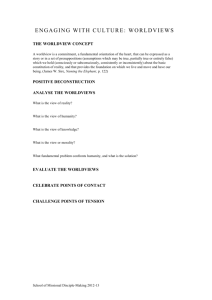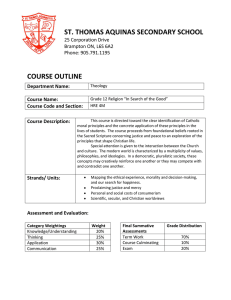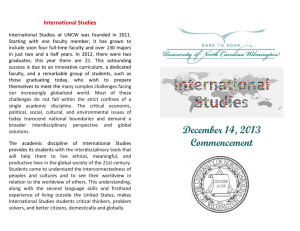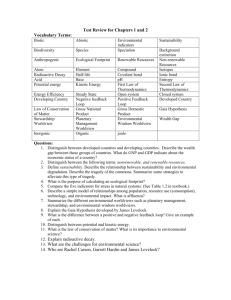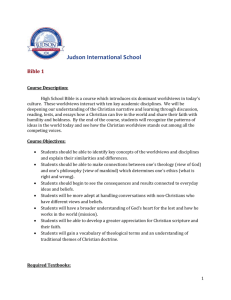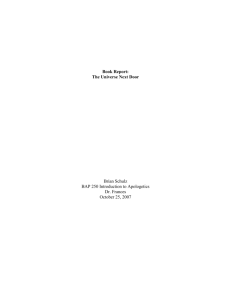LEARNING OUTCOMES IN THE SYLLABI Student learning
advertisement
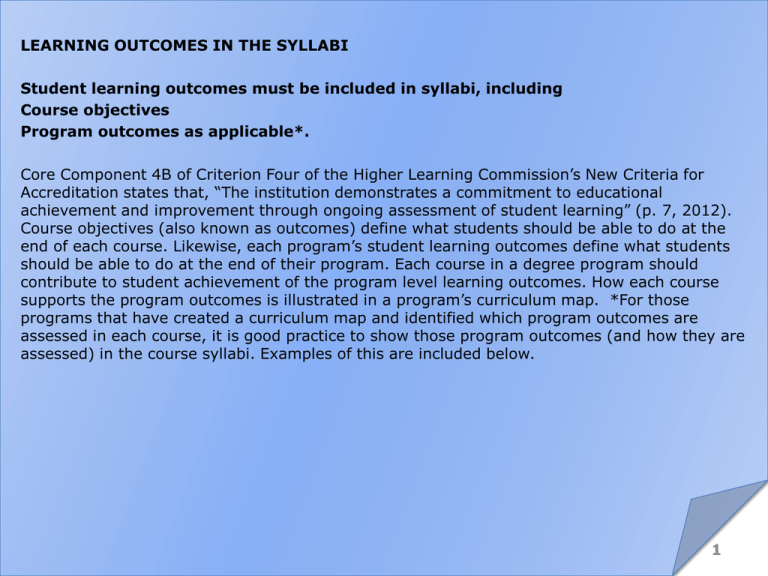
LEARNING OUTCOMES IN THE SYLLABI Student learning outcomes must be included in syllabi, including Course objectives Program outcomes as applicable*. Core Component 4B of Criterion Four of the Higher Learning Commission’s New Criteria for Accreditation states that, “The institution demonstrates a commitment to educational achievement and improvement through ongoing assessment of student learning” (p. 7, 2012). Course objectives (also known as outcomes) define what students should be able to do at the end of each course. Likewise, each program’s student learning outcomes define what students should be able to do at the end of their program. Each course in a degree program should contribute to student achievement of the program level learning outcomes. How each course supports the program outcomes is illustrated in a program’s curriculum map. *For those programs that have created a curriculum map and identified which program outcomes are assessed in each course, it is good practice to show those program outcomes (and how they are assessed) in the course syllabi. Examples of this are included below. 1 Example 1: NTST567 THEOLOGY OF THE ENGLISH NEW TESTAMENT – COLOSSIANS Course Objectives The primary objectives of this course are: Knowledge Upon successful completion of this course, students will 1. Acquire an excellent knowledge of the biblical concepts taught in the epistle to the Colossians 2. Be familiar with major theological themes in the epistles of Paul 3. Better understand the foundations of Seventh-day Adventist beliefs and practices in regard to salvation, the Sabbath and ethical behaviour Skills Upon successful completion of this course, students will be able to 1. Reflect critically on various New Testament theological themes and issues and their contemporary relevance 2. Incorporate various New Testament themes in sermons and Bible studies Attitudes, Values, and Commitments Upon successful completion of this course, students will 1. Be more committed to follow the leading of Christ and Scripture in his/her life 2. Value the importance of prayer and of a Christ-centered life in ministry 3. Place greater value in a biblically-based approach to Christian life and ethical behaviour. 2 Example 1 cont. Program Competencies and Learning Outcomes This course provides skill competencies and learning outcomes needed by students in the Master of Arts in Pastoral Ministry program. The student graduating with a Master of Arts in Pastoral Ministry degree demonstrates competencies as a 1. Capable Biblical Interpreter who Demonstrates proper biblical interpretation skills and applications of biblical teaching 2. Ethical Minister who Applies ethical principles in the context of the Seventh-day Adventist ministry 3. Minister Grounded in Seventh-day Adventist Theology who Understands the historical-theological development of major SDA doctrines 4. Skilled Preacher who Prepares and delivers effective expository and prophetic sermons Focus *** Means of learning Class lectures Required reading Essay on Col 2:16 Sermons * Class lectures Required reading ** Class lectures Essay on Col 2:16 ** Sermons 3 Example 2: CPTR-427 - Object Oriented Design & Programming ABET Student Outcomes B. An ability to analyze a problem, and identify and define the computing requirements appropriate to its solution. C. An ability to design, implement, and evaluate a computer-based system, process, component, or program to meet desired needs. I. An ability to use current techniques, skills, and tools necessary for computing practice. J. An ability to apply mathematical foundations, algorithmic principles, and computer science theory in the modeling and design of computer-based systems in a way that demonstrates comprehension of the tradeoffs involved in design choices. K. An ability to apply design and development principles in the construction of software systems of varying complexity. 4 Example 2 cont. Course Outcomes Upon completion of the course students should have the abilities listed below. The ABET student outcomes supported by the specific abilities are identified as letters within parentheses at the end of each ability. 1. Justify the philosophy of object-oriented design and the concepts of encapsulation, abstraction, inheritance, and polymorphism (b). 2. Describe how the class mechanism supports encapsulation and information hiding (j, k). 3. Design, implement, and test the implementation of ìis-aî relationships among objects using a class hierarchy and inheritance (j, k). 4. Compare and contrast the notions of overloading and overriding methods in an objectoriented language (j). 5. Justify the philosophy of object-oriented design and the concepts of encapsulation, abstraction, inheritance, and polymorphism (i, k). 6. Design, implement, test, and debug simple programs in an object-oriented programming language (c, i). 7. Explain the relationship between the static structure of the class and the dynamic structure of the instances of the class (c, k). 5 Example 2 cont. 8. 9. Describe how iterators access the elements of a container (j). Explain the value of application programming interfaces (APIs) in software development (b, k). 10. Apply key elements and common methods for elicitation and analysis to produce a set of software requirements for a medium-sized software system (b, k). 11. Use a common, non-formal method to model and specify (in the form of a requirements specification document) the requirements for a medium-size software system (b, c, k). 6 Example 3 Example 3: EDFN500 PHILOSOPHICAL FOUNDATIONS OF EDUCATION & PSYCHOLOGY SCHOOL OF EDUCATION CONCEPTUAL FRAMEWORK Code SED FRAMEWORK ELEMENTS Focus I. Worldview: Addresses appreciation of the perspectives of others and development of a personal philosophy from which action and service arise. Graduates will be able to . . . I.A Explain worldviews and trace their historical development ** I.B Critique worldviews from a Christian perspective ** I.C Integrate principles of a Christian worldview into their chosen fields of study [or their chosen WV] ** II. Human Growth & Change: This element addresses principles of growth, development and learning and the use of these principles to effect positive change. Graduates will be able to . . . II.A Describe human development * II.B Apply current theories of learning III. Groups, Leadership & Change: This element addresses principles of group behavior and the use of these principles to effect positive change for individuals and organizations. Graduates will be able to . . . III.A III.B III.C III.D III.E Facilitate change in groups and organizations Relate effectively with various cultural, racial and special interest groups Identify political and legal issues Manage human, financial, and material resources Demonstrate servant leadership * ** * IV. Communication & Technology: This element addresses oral, written, intrapersonal and interpersonal communication as the essence of human behavior, and technology as it enables, supports and enhances human interaction & learning. Graduates will be able to . . . IV.A Communicate effectively in written, verbal and nonverbal forms * IV.B Use electronic tools effectively for professional communication, teaching, and research V. Research & Evaluation: This element addresses valuing and conducting disciplined inquiry for decision-making. Graduates will be able to . . . V.A Read and evaluate research * V.B Conduct research * V.C Report research finding VI. Personal & Professional Growth: This element addresses commitment to wholistic personal and professional growth. Graduates will be able to . . . VI.A Demonstrate continuing professional development * VI.A Demonstrate ethical behavior in all professional activities ** VI.B Demonstrate balanced physical, mental, spiritual, and social development * 7 Example 3 cont. A. Worldview Specific Instructional Objectives Upon completion of this course, the student will be able to: 1. Explain worldviews and trace their historical development Learning Domain: Cognitive –knowledge, comprehension, analysis Assessment: Class exercises/presentations; written critiques; tests 2. Critique alternative worldviews from a Christian perspective Learning Domain: Cognitive –application, synthesis, evaluation Assessment: Class presentations; written critiques 3. Recognize the worldviews from which others speak or write Learning Domain: Cognitive –knowledge, comprehension, analysis, evaluation Assessment: Class exercises (identify quotations); book reviews, class tests 4. Articulate Christian responses to basic worldview questions Learning Domain: Cognitive Skills –research precision, articulation Assessment: Class discussion and exercises; synthesis paper 5. Recognize and articulate philosophical worldview assumptions that underlie his/her discipline Learning Domain: Cognitive Skills –articulation Assessment: Critique of theories, class exercises, book reviews 6. Defend a personal philosophy of vocation that incorporates harmonious development and service Learning Domain: Cognitive—synthesis; Affective –receiving, responding, valuing, internalizing attitudes Assessment: Synthesis paper 7. Respect others irrespective of the worldviews they may hold Learning Domain: Affective –receiving, responding, valuing attitudes Assessment: Class interaction; synthesis paper 8. Appreciate the Christian worldview, even if it is not his/her primary worldview Learning Domain: Affective –receiving, responding, valuing, internalizing attitudes Assessment: Class interaction; synthesis paper SED Elements I.A I.B I.A; I.B I.B I.C VI.A III.B I.C 8

